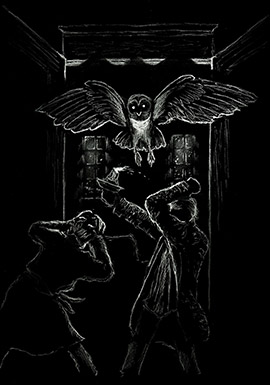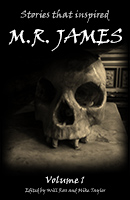
Illustration by M. Grant Kellermeyer
In this bumper episode we examine M.R. James’s favourite story by his favourite author, ‘The Familiar’ by Joseph Sheridan Le Fanu! Praise doesn’t get much higher than that, but is it all it is cracked up to be? If you are a fan of owls, diminutive, angry men in fur caps and incredibly long sentences, then you are in for a treat.
This episode also features an interview with noted Le Fanu expert Brian J Showers of Swan River Press and readings by Debbie Wedge.
This episodes artwork comes curtesy of M. Grant Kellermeyer of Oldstyle Tales Press.
Story notes
- Joseph Sheridan Le Fanu (Wikipedia)
Some biographical information on the man himself. - ‘In a glass darkly’ by Le Fanu (Wikipedia)
This is the volume of ghost stories in which this story most famously appears, featuring the ‘occult detective’ Dr. Martin Hesselius. - M.R. James on J. S. Le Fanu (Ghosts and Scholars)
An article based on the presentation on Le Fanu that M.R. James gave to the Royal Institution of Great Britain on March 16th, 1923. - Haunted Holidays – The Terrible Occult Detectives (Tor.com)
A very amusing essay on the ‘occult detective’ in literature, which singles out Le Fanu’s Dr Hesselius as the first occult detective. - Reminiscences of a bachelor by J. Sheridan Le Fanu (Swan River Press)
We mention this title in our interview with Brian J. Showers. The book features ‘The Watcher’ and other stories, as well as its original companion piece ‘The Fatal Bride’ and notes on both stories.
Also mentioned in this episode
- Monsters – Don’t treat them gently! (Pleasing Terror Games)
The new M.R. James board game from friend of the show, James Drewitt. - ‘No Diggin ‘ere’ and ‘Barchestering’ T-shirts (redbubble.com)
Two new MRJ T-shirts from our regular reader Debbie Wedge! Also available as baby-grows, mugs, phone cases etc.
Podcast: Play in new window | Download
Subscribe: RSS
Tags: Brian J Showers, Captain Barton, De Hesselius, Dublin, Ireland, Joseph Sheridan Le Fanu, Le Fanu, M.R. James, Owls, The Familiar, The Watcher








Missed you guys tremendously (time wise), please don’t try to break records. Anything like can a two month absence is unbearable. Now for the truly good, great stuff: if I had turned to Le Fanu, as any proper Jamesian naturally would, I’d have started with this very one. It has a lot going for it and ultimately I do think it delivers the goods. Spooky, atmospheric, not in your face terror. Plus owls. So yes, grand and insightful analysis from you as ever -This isn’t actually my favourite Le Fanu, so I am keeping my fingers crossed that you will venture further into the realms he has so magnanimously bequeathed us – thank you for yet another superbly entertaining and quirky (that’s not an insult, in my book it’s high praise) podcast, all kinds of best wishes with your personal real lives and I hope you can go on living them merrily and podcasting macabrely. I hope such an adverb exists. It suits you to ..perfection? Yes, I rather think it does.
This is not necessarily an important or academic point, but “rump and a dozen” in the phrase “I’ll wager a rump and a dozen I collar the ghost, and convince even you before many days are over”, clearly means a steak and 12 oysters.
I wouldn’t mind a rump and a dozen now.
In a note in my edition of In A Glass Darkly, it says a dozen bottles of claret.
Have to agree with Will on this one – it started strong and the initial scene of Barton walking through the lonely construction site had me going, but as soon as the little angry man appeared, it was over. Thankfully your show was way better!! This was my first LeFanu so I hope others are actually better. Here is a link to a pic of the little guy I imagined
http://comicvine.gamespot.com/mutt-jeff-104-mutt-jeff/4000-165201/
so you can see why the illusion was instantly dashed. Amazing you guts talking about such a story is still so fun!
“guys”! ha
Congrats on the new arrival!
Agree with the above on this one, started strong then got “unscary” for the most part. Still, was good to hear the show, nice work!
As for the owl….couldn’t help but think of this….
https://www.youtube.com/watch?v=GK3bYhDcUVg
Well done chaps, I’m loving ‘season 2’ of the podcast. Did you know that Le Fanu’s wife suffered from a mysterious lethargy-enduring psychiatric disease and died of hysteria (no doubt influencing the plot of Carmilla), after which he himself became reclusive and prone to nightmares, dying in his bed. His doctor – who I’d like to think had read the Familiar, described his final expression as being contorted with horror. That said I’m afraid I also partly agree with Will about The Familiar, though I rate the rest of In a Glass Darkly. I’d recommend his ‘Account of Some Strange Disturbances is Aungier Street’ (an earlier version of the Harbottle story), which strikes me as much more Jamesian. What James made of le Fanu’s lesbian vampire theme is anyone’s guess…
Enjoyed the show! Would love to hear you natter on about “Squire Toby’s Will” by Le Fanu. The dog in that story is quite creepy.
One of the first things ”The Familiar“ brings to mind is the film DON’T LOOK NOW (directed by Nicholas Roeg, 1973), which itself is based on the short story by Daphne du Maurier. Without getting too much into details, both stories have some obvious similarities. I personally do not know if du Maurier would have read Le Fanu but I would not rule it out. Though perhaps I am just connecting dots that aren’t significant enough to warrant connecting.
On a side note, the term ’The Familiar‘ strikes me as being good choice in place of ’The Watcher’ (as the revised title) for a couple of reasons: The first thing is the owl, which strikes me as being hinted at as the embodiment of wrath in an intentionally ambiguous way. (Sometimes an owl is _just_ an owl…? Or not. Or both.) In fact, one might argue that one of compelling things of this narrative (and its crescendo) is _ambiguity_, _uncertainty_ (which, if you think about it, what is the very concept of ’supernatural’ if not ambiguous…). The last paragraph, before the epitaph, is basically Le Fanu driving home this ambiguity, but by even doing so seems to suggest that there is not a natural/supernatural binary opposition, but that the two paradigms are perhaps two sides to the same coin, or in a sort of yin-yang relationship… Probably not what Le Fanu was thinking, but that’s one way to read it.
And, yeah, “Familiar” as witch’s-cat-type-figure! Although familiars didn’t necessarily have to be cats: “Familiars”, whatever type of animals they may be described as, were also thought of as demons.
And probably this has been discussed before as well, but here are a couple of other similarities—perhaps inspirations, direct or subconscious—to James‘ stories: supposedly supernatural forces (be they visible or invisible) having physical impact upon main characters, and particularly the the deep indenture near the foot of the bed, which brings to mind both the sheet ghost in ”Oh, Whistle…“ and poor Thorbjorn ”pushing something away from him which was not there” in ”Count Magnus“.
Be it a story of Old Testament comeuppance (hence Biblical Job reference abandoned by Le Fanu—too obvious, was it?), or internal madness due to uncertain or guilty conscience, or whatever form of Karma, it is a compelling, unconventional supernatural/uncanny tale. How can you not dig it, William Ross, or at least see why James did? 😉
Also worth noting: the idea of the ’uncanny’ that Freud draws on so much comes from the German word unheimlich, which more accurately translates as ’un-home-like‘—unfamiliar! So the uncanny experience can basically be thought of as the unfamiliar suddenly becoming familiar, or vice versa. Basically the transition from one to the other marks this experience, or, one might argue, the interplay between the two, or the uncertainty of being able to distinguish the familiar from the unfamiliar.
This isn’t my favourite LaFanu story. It’s just hard to get into and then the little man, it’s not scary. Which is weird because there are a lot of odd things that could be scary, the things that seemed to be set in weird Irish folklore, but it doesn’t do anything for me.
I agree about the cruelty, LeFanu is very bleak in many ways to the point of being oppressive. The things I enjoyed was the horror in bright day light aspect, that’s quite unusual at this time. Modern writers such as Stephen King uses this all the time in his works.
Is this the episode that asked the question ‘what language other than Latin would be used for a magic spell/incantation? I’d suggest Etruscan – the Romans used Etruscan for their hoodoo. The Emperor Claudius was big on augury, and used Etruscan for his efforts.
I’ve just re-read this story (and re-listened to the podcast), and thought I’m make a few more comments. First, I seem to have less of a problem with the ‘little man’ character who haunts the Captain than the hosts do. It is made clear that this dwarf-creature bears a resemblence to a man the Captain wronged, if not killed. Although not an ephemeral ghost, he seems to be a shrunken, twisted version of the sailor – and has good reason to be angry! Think in terms of him being shrunken down to his raging essense.
Second, the key that triggers the appearance of the being is the decision of the Captain to marry – and marry a younger woman. After years of suffering no ill effect of his crime, it is this choice that brings his fate down upon him.
Third, I can’t see what Doctor Hesselius could have done for the man. In fact, in those years, doctors could do little more than occasionally diagnose a condition correctly – cures, or even successful treatments were very rare, and if anything most treatments were positively harmful for the patient. Hesselius made sure the servant would watch the Captain as well as he could, and a doctor could have done no better.
And finally, the title. The Watcher seems a much better choice, but La Fanu regularly reused or retitled his earlier work, no doubt in an effort to squeeze more money out of them. A commenter above mentioned the owl, and I think this is the proper source for the name. The Captain was protected from his tormenter as long as there was a physical barrier between them. Somehow, the owl – creature of the night, and a worthy familiar – was insinuated into the house in order to allow the demon-revenant access to his victim. So we have a creature that has both corporeal limits, yet follows super-natural rules. And we have the sense that the end was inevitable -a way would have been found to enter the safety of the bed chamber.
So unlike some of La Fanu’s other stories, this one works for me. Not a favorite, but it works.
I’ve always been left cold by Le Fanu except for An Account of Some Disturbances in Aungier Street. That one though it has some longeurs has some very creepy scenes. Also a nasty hanging judge.
Responses to this type of story are very individual. All I can say is that when I first started getting interested in ghost stories in my late teens / early twenties this was one of the few stories that really frightened me. The others were Green Tea, Count Magnus, oh Whistle and I’ll Come to You and The Monkey’s Paw.
Of course there were many others that I found intriguing and exciting, but those five stood out. Mayby it’s because hauntings seem so malign and disproportionate to the actions that trigger them. This doesn’t really hold for The Watcher, but you don’t learn that until the haunting has ended.
A story like The Stalls of Barchester Cathedral, which is one of my favourites, is engrossing but less frightening because it lacks that ‘could this happen to me’ chill. So long as you don’t push an elderly church dignitary down the stairs (not spelled out, but obvious early on) you’ll be fi e!
Love your podcast and have been relistening to a lot of them, as well as checking out other programs, during our COVID lockdown in the US. Recently cam across a somewhat strange version of the Familiar as a radio program here:
https://www.relicradio.com/otr/2019/10/the-familiar-ghost-by-cbs-radio-mystery-theater/
I hope you have time to more of your podcasts soon!
Saklani
re: angry little man in funny hat
Wouldn’t be surprised if there was some influence by the old Irish legend of Abhartach (a name that essentially means”Dwarf”) an evil chieftain and sorcerer who is killed by hero and returns from the dead as a blood drinking undead creature until he is killed by a wooden sword.
It’s a bit of a longshot but it’s Irish and it’s an example of a diminutive undead creature.
The legend is also allegedly an inspiration for Dracula as it is the oldest example of a vampiric noblemen, especially one with an actual fief, and really the only one until The Vampyre in 1819.